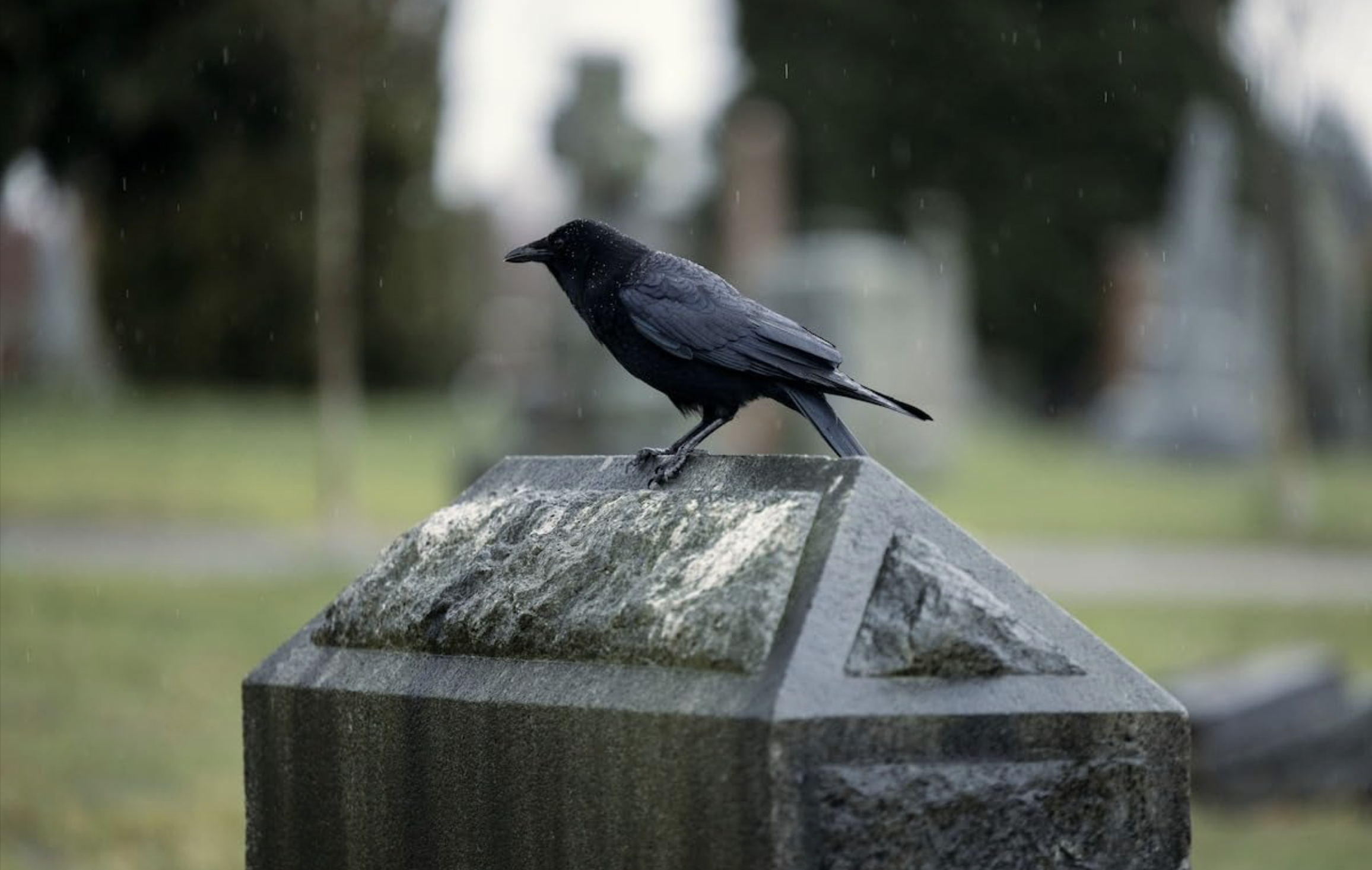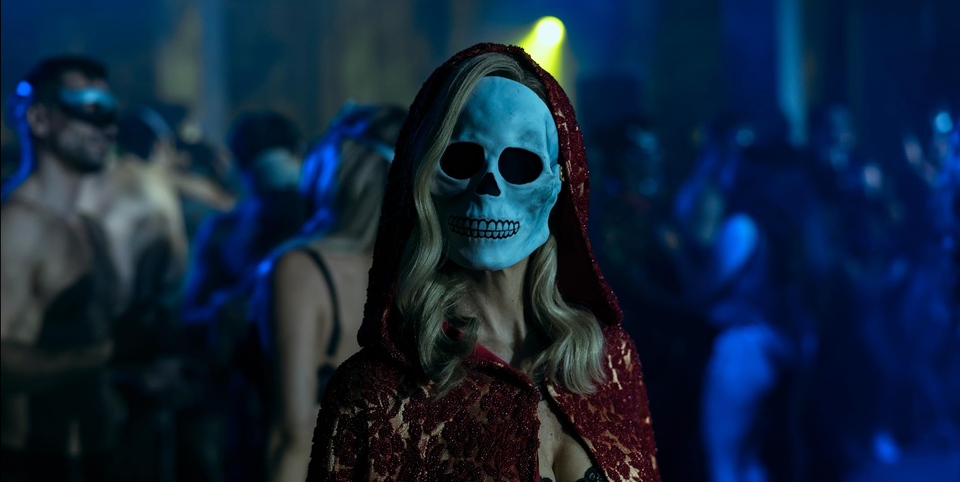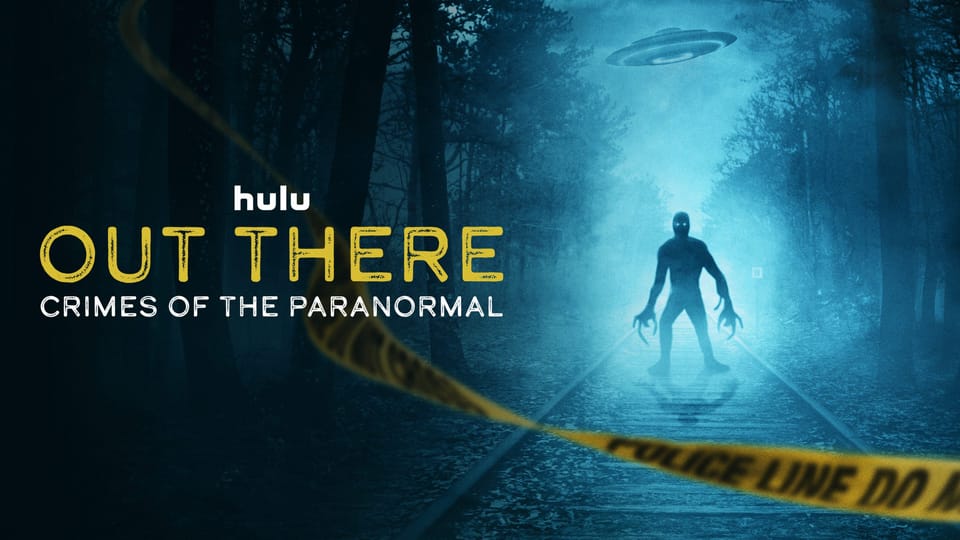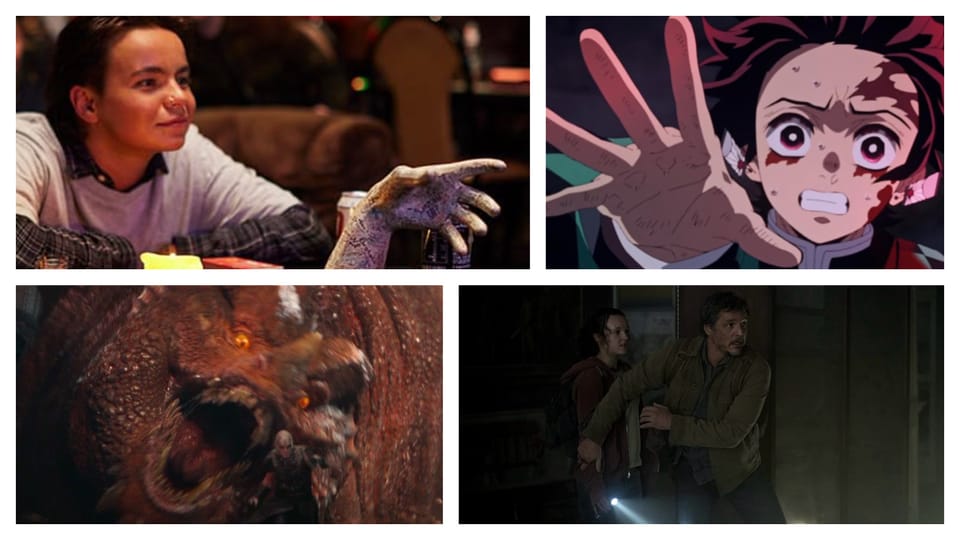Edgar Allan Poe was one of my favorite authors when I was in high school. I was captivated by the dark worlds that he created and claimed his works as among my favorite reads — particularly stories such as "The Tell-Tale Heart," "The Pit and the Pendulum," and "The Cask of Amontillado." I printed out copies of "The Raven," pasted them in my binders and fell in love with the word "nevermore".
Although I haven't read Poe's work in years, when I learned that Mike Flanagan had adapted Poe's works into a mini-series, I was immediately invested. Flanagan has been the show runner on some of my favorite horror series, including The House on Haunted Hill and The Haunting of Bly Manor (both gorgeous adaptations of classic horror novels) and Midnight Mass — all of which beautifully combined horror with deep emotional themes, such as family, love, and belief.
By comparison, The Fall of the House of Usher is much less emotionally weighty — but I love it nonetheless. Instead, it reflects some of the themes of Poe's work, which involve death, madness, loss, and comeuppance. Somehow weaving together the plots and symbols from multiple short stories and poems into a cohesive whole that also delves into modern issues, such as the opioid epidemic, ethical medical research, and corporations getting away with anything and everything. It's an incredibly difficult achievement that somehow feels effortless – presented through a combination of phenomenal acting, stunning sets and costume design, and stellar cinematography in an artfully poetic spectacle of death.
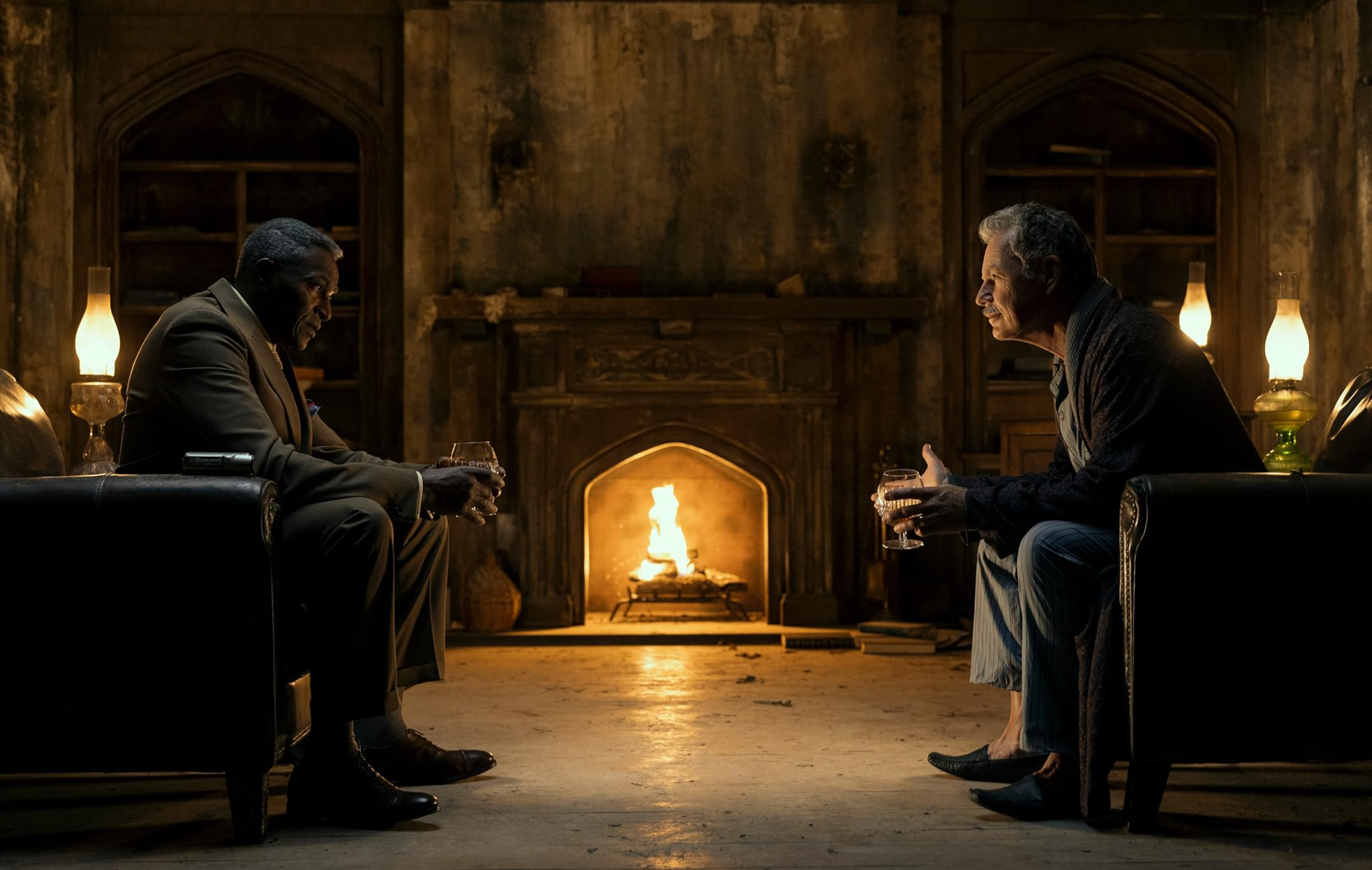
At the opening of the series, we learn that all of the children of Roderick Usher are dead, each one having met their demise under strange and horrific circumstances. Facing the fall of his entire legacy, Roderick Usher (played Zach Gilford when younger and Bruce Greenwood when older), the patriarch of the Usher family, agrees to meet with Auggie Dupin (Carl Lumbly), a federal prosecutor who has been trying to nail the Usher family for their crimes. Facing each other within the bones of Roderick's old decaying family home, the two men explore the series of events that led them to this moment. Faced with the ghosts of his children, Roderick confesses the truth to Auggie — his entire life story of how he and his sister Madeline (Willa Fitzgerald when younger and Mary McDonnell when older) came to wealth and power, how each of his children died, and how the sins of the past that brought these horrific events fruition.
If you have read Poe's stories, then the means in which these characters are dispatched is not going to be entirely a surprise to you — especially since the titles of the episodes reflect the titles of Poe's short stories, which pretty much gives away the ending. So, I don't feel like I'm spoiling all that much as I talk about the events of the series —
nevertheless, spoilers ahead.
The Poverty of Absolute Wealth and Power
Virtually every single member of the Usher family is terrible in their own unique ways. Roderick and his sister Madeline built their empire through a series of ruthless acts and proceeded to hold on to their wealth and power via their lawers and other aggressive and brutal acts. Likewise, Roderick's children don't fall far from the tree:
- Perry (Sauriyan Sapkota), the youngest, is obsessed with drugs, sex, and debauchery, using them as a form of manupulation.
- Camille (Kate Siegel) controls the PR for the family and gathers dirt on everyone, while engaging in in sexual acts with her staff.
- Leo (Rahul Kohli) is a video game producer and the public face of the family and tends to be self involved, having affairs and partying as he pleases.
- Victorine "Vic" (T'Nia Miller) outwardly works to bring a new, potentially lifesaving heart mesh implant to market and is willing to cut corners and falsify data in order to achieve it.
- Tamerlane "Tammy" (Samantha Sloyan) is obsessed with making her mark by launching a line of health products, while using her husband as nothing more than a tool to bring the project to fruitition.
- Frederick "Freddie", the eldest, blindly toes the family line, knowingly hiding illegal business activities and becoming abusive and violent in response to feeling weak.
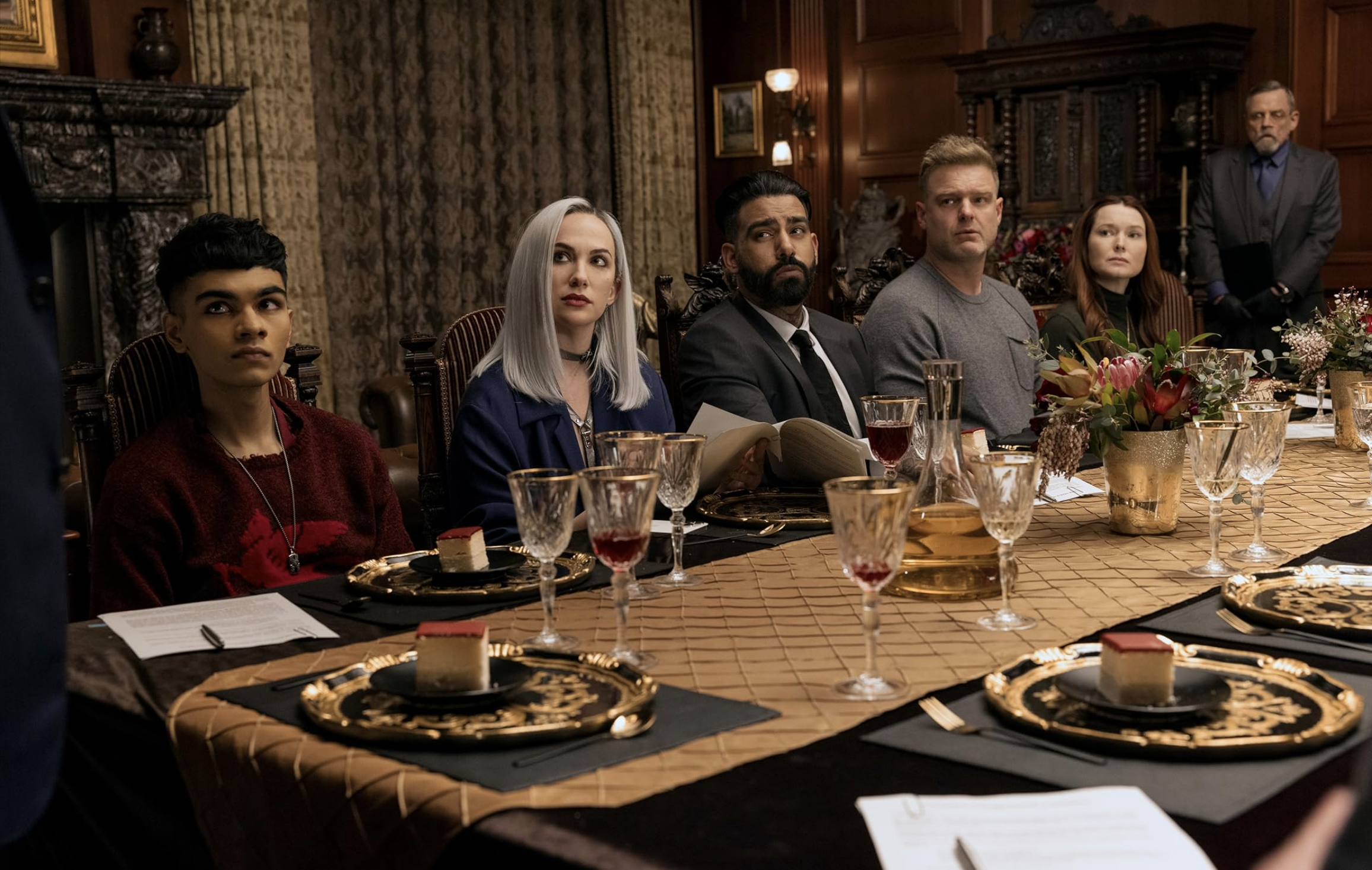
Considering the kind morally questionable people they are, the deaths of Roderick's kids feels like a kind of moral justice. It is their own ruthless ambition and lack of compassion that drives them to the brutality of their ends.
However, there is more nuance to their stories — because their flaws and fates can be drawn back to their father, a man whose ambition and greed brought them to the rim of death in the first place. Each of his children have only a limited sort of agency, since their ends have been decided for them, many before they were even born.
Roderick only loved one woman in his life, his first wife, Annabel Lee (Katie Parker), with whom he had the first two children. After he looses her, he sleeps with a number of different women, resulting in a four more children showing on his doorstep. Because of how he had been treated by his father — a man who closed the door in his face — Roderick vowed to always leave the door open. Any children of his who showed up, he would welcome into the family.
But there was a cost to being part of the Usher family, an expectation of that they further the family legacy. The door may be open, but the halls inside are cold, providing no comfort or compassion, nothing to nourish their own creativity, interests, or passions. As an Usher, the children muser serve the family — not in the form of supporting each other, mind you — but in competing against each other to develop a world-changing concept that will feed the accumulation of wealth, maintain the family image, and keep the family secrets.
The emptiness that Roderick evokes is highlighted when Roderick is confronted by the ghost of Annabel Lee, who speaks of her grief at loosing her children to him and his failure to give them anything substantial. She says,
When people asked how you took them, how you convinced them away from me. "He's rich," I'd say. "He's rich." And you don't understand what that word means. They were young. They only knew appetite, and "Here," you said, "come with me. Gorge yourselves." How could I compete with that? You didn't feed them though, did you? You starved them. Less and less of them came back each time until one day they were empty. They were syphoned. You started filling them up with... What did you fill them up with, Roderick? What did you have to fill them with? Because you weren't rich, were you? I thought you were a rich man all this time, but I... I see you now. I look at you and I see... you. The poverty of you.
Again and again, as we see the children live out their last moments, we are greeted with the desperation of Roderick's children. All of each of them wants is to earn their father's love and approval. Over drinks, Freddie, Tammy, and Vic discuss this sense of desperation, with Tammy noting that all of the "bastards" who show up were always trying to fill the dad-sized hole in their lives — and Vic shoots back that, although Freddie and Tammy were the "legitimate" children of the beloved Annabel Lee, they also have the same hole; they are just as desperate for Roderick's love.
All of Roderick's children are empty in the end — and this is perhaps most heartbreaking clear in Vic's episode, "The Tell-Tale Heart." When her partner and lover Dr. Allessandra Ruiz (Paola Núñez) discovers Vic's falsified data regarding the development of the heart mesh, Vic at first becomes hostile about the matter and then begins to beg Allessandra not to go against the Usher family. Not only is Vic urgently attempting to make the device successful in order please her father, she is also terrified of her own family, knowing that the Ushers will crush Allessandra if she attempts to go public with the truth — and this fear leads to Vic committing a desperate act, an act she can't face and so goes mad hearing a strange rhythmic sound.
But it's not a heart she alone could hear. Roderick comes to her and discovers that she had killed Allessandra and cut open her chest in an attempt to keep her alive with the heart mesh. The sound was the heart mesh enlessly pumping a lifeless heart. When she turns and faces In the end, turns to Roderick and drives a knife into her own heart — and just before she dies, she looks up at her father and says, "Daddy?" The moment is heartbreaking, as she turns into a little girl just wanting her father to comfort her.
Although he shows horror and loss in the moment, Roderick holds true to his legacy — removing the heart mesh from the corpse and leaving before the police arrive to prevent them from getting their hands on it.
All of this is made all the more tragic, when at the end of the series, it is revealed that Roderick's children and heirs were doomed from the start. Decades earlier, Roderick and Madeline made a momentous choice during a New Year's Eve celebration at a mysterious bar that echoed down through the generations of the entire Usher family.
The Shadow of Death
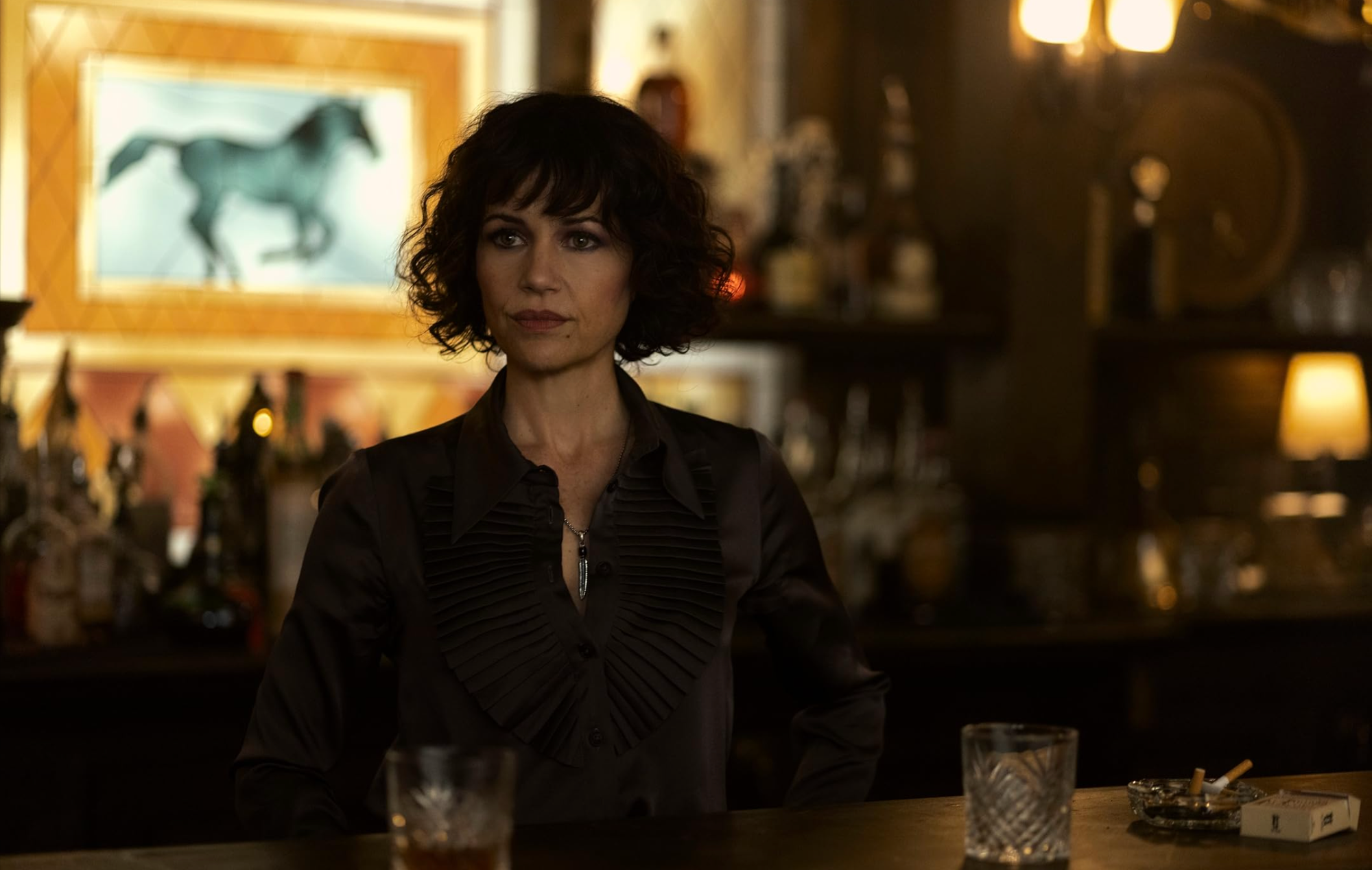
The mysterious shadow that falls upon the Usher family is the figure of Verna (an anagram of raven), played wonderfully by the stunning Carla Gugino. She haunts Roderick like a ghost and appears before each of his children prior to their deaths.
She is also the catalyst for all of the deadly events that unfold.
Following a fateful New Year's Eve party, Madeline and Roderick go to a local bar to build alibis. While there, they meet the enigmatic bartender Verna and spend the night in her company. She asks them about their resolutions, their greatest desires for the future — and as the night churns into morning and the bar empties out, she offers them a deal.
Over a drink of rare, expensive whiskey, Verna reveals that she knows the crimes Madeline and Roderick committed earlier in the evening and that she can ensure the success of their future. She promises that the siblings will have all the wealth and success they desire and that they will never be held accountable for any of their actions by the authorities or anyone else. In exchange, when Roderick meets the end of his natural life (at a time he would have died anyway), then Madeline and the entire Usher line would die with him. Verna paints this payment as a kindness (why not have his children pass away at their prime instead of facing the indignities of old age).
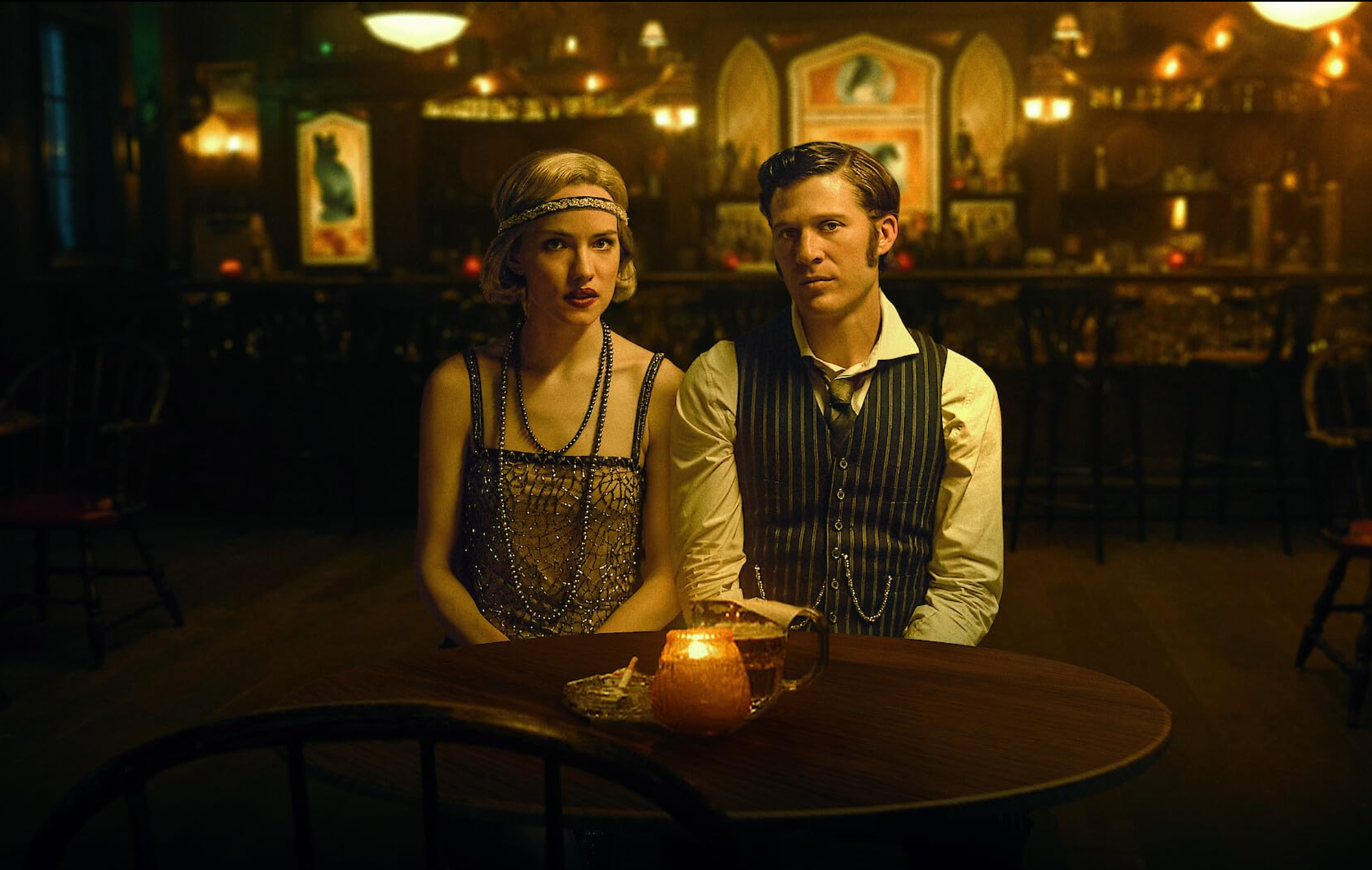
What fascinates me about this moment is the reversal in our expectations of these characters. Throughout the show, Madeline always seems to be the more ruthless of the two siblings, urging Roderick when they are young to take decisive action and demanding the "head" of anyone who threatens the family.
But on this momentous New Year's Eve night, it's Roderick — who already has two children — who speaks first. "Done," he states without hesitation, condemning his current and future children to follow him into death decades later. It's such a sharp and sudden decision that even Madeline is surprised in the moment, turning to look at her brother in surprise before quietly echoing her own agreement.
And although they quickly forget the details of this choice, the memory fading to a kind of dream, I think it's notable that Madeline never has any children of her own. It feels like a way of avoiding the cost. Instead, she chooses to work to developing some kind of immortality by attempting to upload consciousness into computers, giving Verna nothing to take away by her own life.
The set up here feels like a deal with devil. However, I don't believe Verna is a devil in the traditional sense. She is certainly supernatural, can appear in different forms and influence the world, and can't seem to be killed by physical means. But rather than a devil, she seems more to be some kind of embodiment of death itself.
When Madeline confronts Verna, attempting to get a better deal, Verna offers a poem in answer. "What's a poem, after all, if not a safe space for a difficult truth," she says, and then gives a phenomenal reading of a portion of Poe's "The City in the Sea."
Lo! Death has reared himself a throne
In a strange city lying alone
Far down within the dim West,
Where the good and the bad and the worst and the best
Have gone to their eternal rest.
There shrines and palaces and towers
(Time-eaten towers and tremble not!)
Resemble nothing that is ours.
Around, by lifting winds forgot,
Resignedly beneath the sky
The melancholy waters lie.
. . .
But lo, a stir is in the air!
The wave—there is a movement there!
As if the towers had thrust aside,
In slightly sinking, the dull tide—
As if their tops had feebly given
A void within the filmy Heaven.
The waves have now a redder glow—
The hours are breathing faint and low—
And when, amid no earthly moans,
Down, down that town shall settle hence,
Hell, rising from a thousand thrones,
Shall do it reverence.
This poem seems to be a kind of hint to Verna's true nature. This seems to be confirmed in another conversation, when she describes being somewhere below and becoming fascinated by all the "adorable little things" living their lives above, and how she came up to witness what these things will do and are capable of for herself. Presumably, that's when she begins to make deals.
It's not entirely clear what Verna's motivations are for these deals or what she gets out of them. Personally, I'm inclined to believe that her motivations revolve around simple curiosity. She offers deals to see what choices people will make and how they will act once granted their desires. The price in exchange is something consequential, something the person loves or values most (such as the death of the entire Usher bloodline) — because the choice has to mean something. It has to weigh heavy.
Verna's interest in choices and seeing how they play out is also revealed in the way she approaches each of Roderick's kids before their deaths. Nothing is going to stop their impending death — but she still offers all of them (save one) a choice, an opportunity to change the way in which their death unfolds. These offers are small and subtle, but nevertheless present. She tells Perry that it's not too late to "end this," meaning the massive party that will end tragically; warns Camille that she doesn't have to snoop in the research facility; offers Leo an opportunity to choose to adopt and save some cute cats instead the one cat that would destroy him; gives Vic the opportunity to do the right thing instead of taking advantage of a woman with a heart condition; and lets Tammy know that it's not too late to call her husband and make amends. In each case, she offers them an out, a chance to not be a terrible person — and when they continue with their course, she unleashes a poetically vicious means of dispatching them.
But Freddie is a different story. With Freddie, Verna is angry.
In the first episode Morella (Crystal Balint), Freddie's wife, makes a tragic mistake that leaves her near dead and needing intensive care in order to recover. While she's healing, Freddie becomes increasingly paranoid about how she became injured and grows psychologically and physically abusive to his wife — and these actions have a consequence. When Verna comes for Freddie, she tells him that she could have done this (killed him) in any way she wanted, even give him a simple heart attack. But essentially his actions were so despicable, she decided to get more creative — leading to a terrifying and deserved demise that echoes the pit and the pendulum.
By contrast, Verna approaches Lenore, Freddie's daughter (and the last of the Usher bloodline), in a much different manner. Verna never had to present her with a choice. Lenore's actions already leaned toward the noble. She behaved with honesty and compassion and refused to stand down when she witnessed something unjust.
So, at Lenore's end, Verna offers a gift. She tells Lenore that because of her choices, her mother will not only survive, but will move forward with courage and will work to help other abused women, thus saving thousands of lives. She tells the girl that all of this good what due to her choices. Then, she merely touches Lenore's forehead, letting the girl fall gently into the sleep of death.
Later, when Verna meets Arthur Pym (Mark Hamill), the Usher family's notorious lawyer and iceman, she tells him about his future and how the fall of the Usher family will led to his final years being spent in prison. As with others, she offers him a deal, a chance to save himself, but he declines — and Verna is just as pleased with this refusal as she would have been with an acceptance. "Thank you," she tells Pym. "This has been a pleasure."
Verna is captivating and fascinating. Though she is a powerful and incomprehensible being, she isn't particularly frightening — if you don't go around making deals with her and if you don't make terrible choices worthy of terrible ends. She is not particularly manipulative and doesn't attempt to trick people into deals. In a sense, she allows those with whom she meets to live out the consequences of their choices — both on themselves and the people around them — and delights in witnessing the outcome, good or bad.
